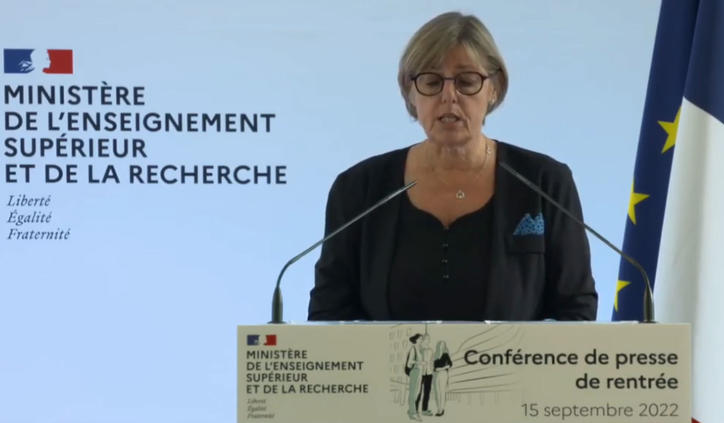
The press conference on the start of the 2022 student year presents an update on the major guidelines to come
The launch of the academic year on 15 September was an opportunity for Sylvie Retailleau, Minister for Higher Education and Research, to give her first press conference. She took stock of the major guidelines for the coming year, in the areas of student life, guidance and training courses, and a new policy for sites.
Le ministère propose ainsi un « zoom sur les grandes orientations », parmi lesquelles on retiendra cinq points importants : la solidarité avec l’Ukraine, les bourses, l’accès au master, la vie étudiante et l’entreprenariat.
Une forte solidarité avec l’Ukraine
Revenant d’abord sur l’année écoulée, la ministre a mis l’accent sur la « forte solidarité » qui s’est déployée en France pour les étudiants et les chercheurs d’Ukraine. Répondant à un « devoir de solidarité », la France a immédiatement pris des mesures d’urgence pour faciliter l’accueil des étudiants et chercheurs en provenance d’Ukraine.
Parmi celles-ci, le ministère distingue notamment une mesure pour favoriser l’insertion des étudiants déplacés d’Ukraine dans l’enseignement supérieur français, avec la « mise en place d’une plateforme de mise en relation entre les étudiants ukrainiens et les établissements d’enseignement supérieur français avec l’appui de l’agence Campus France ».
Vers une réforme des bourses
La ministre a rappelé par ailleurs que d’autres mesures d’urgence ont été déployées pour préserver le pouvoir d’achat des étudiants face aux effets de l’inflation : revalorisation des bourses sur critères sociaux, des aides au logement, maintien des repas à 1 euro pour les étudiants les plus précaires, gel des droits d’inscription à l’université et des loyers en résidence CROUS.
Sur ce point, la ministre a annoncé que cette nouvelle année universitaire serait l’occasion pour le Gouvernement d’ouvrir le dossier de la réforme des bourses. Une concertation devrait ainsi avoir lieu en octobre afin de redéfinir les aides financières pour l’accès aux études supérieures.
Un nouvel accès en master
Autre grand chantier, la création en 2023 d’une plateforme nationale dédiée aux étudiants pour l’accès en master, dans le but résorber les tensions entre offre et demande à l'université. « L’objectif est clair : améliorer le service rendu aux étudiants en regroupant l’ensemble des formations sur une seule plateforme», a souligné la ministre.
La mise en place de cette plateforme qui a pour objectif de « fluidifier le processus de recrutement » est prévue au cours de l’année 2023. Ce sera un « guichet unique de dépôt des dossiers de candidature » qui « reposera sur un calendrier national pour les réponses données aux candidats ».
Des schémas territoriaux de la vie étudiante
En octobre, se tiendront également des « concertations territoriales » qui ont pour vocation de mettre en synergie d’autres thématiques de la vie étudiante : santé, culture, sport, inclusion, engagement solidaire. Selon la ministre, il y a en effet une « hétérogénéité des territoires et des lieux d’études ». C’est pourquoi, poursuit-elle, « l’échelle territoriale est la plus indiquée dans la définition de la politique de vie étudiante ». Dirigés en région par les rectorats, ces échanges territoriaux porteront aussi sur la formation, l’orientation et l’insertion. Ils devraient déboucher sur l’élaboration de schémas directeurs territoriaux de la vie étudiante par région académique en juin 2023 qui seront ensuite déclinés en « schémas directeurs de la vie étudiante dans les établissements ».
La valorisation de l’esprit d’entreprendre
Autre point abordé, l’entrepreneuriat étudiant. L’esprit d’entreprendre continue en effet son essor au travers des Pôles étudiants pour l’innovation, le transfert et l’entrepreneuriat (PEPITE). Le dossier de presse de la conférence rappelle que 33 pôles ont été créés depuis 2014 sur les sites d’enseignement supérieur et que le réseau de mentorat pour accompagner les jeunes entrepreneurs a été renforcé avec plus de 1300 mentors référencés par les PEPITE pour venir en aide aux porteurs de projet. Et le dossier de presse d’annoncer que les PEPITE disposent désormais d’un « outil de gestion unique, appelé Pépitizy, pour superviser l’accompagnement de ces jeunes entrepreneurs ».
Les chiffres clés de la rentrée 2022-2023
2 994 400 étudiants attendus à la rentrée 2022
+ 25 500 étudiants supplémentaires par rapport à la rentrée 2021 (+0,9%)
1 540 000 étudiants dans les universités (-0,1%)
243 500 étudiants en écoles de commerce, gestion et vente (+5,8%)
160 100 étudiants dans les écoles d'ingénieur (+1,3%)
67 300 étudiants dans les formations culturelles et artistiques (+2,2%)
Related contents
Recommended News



















































